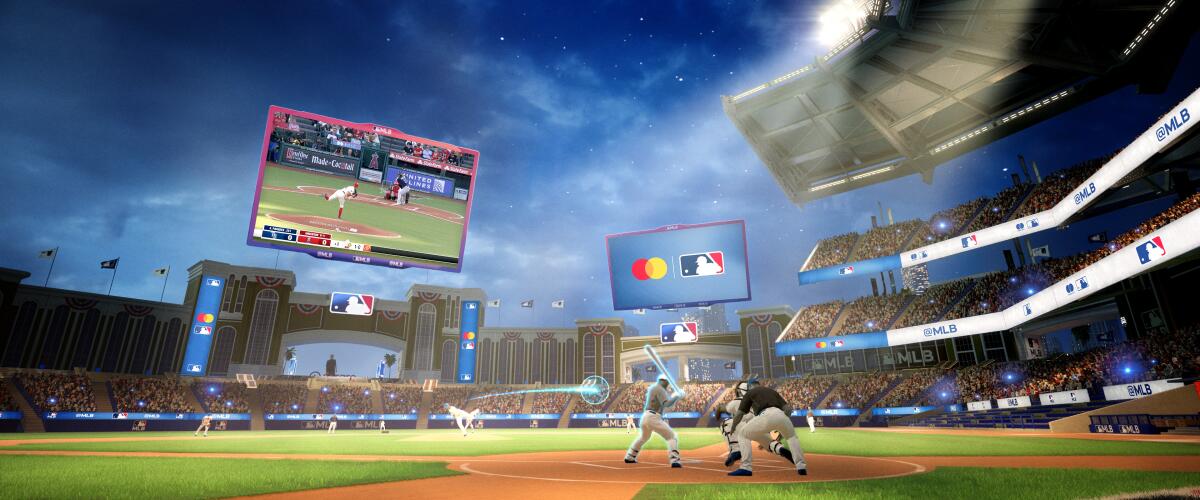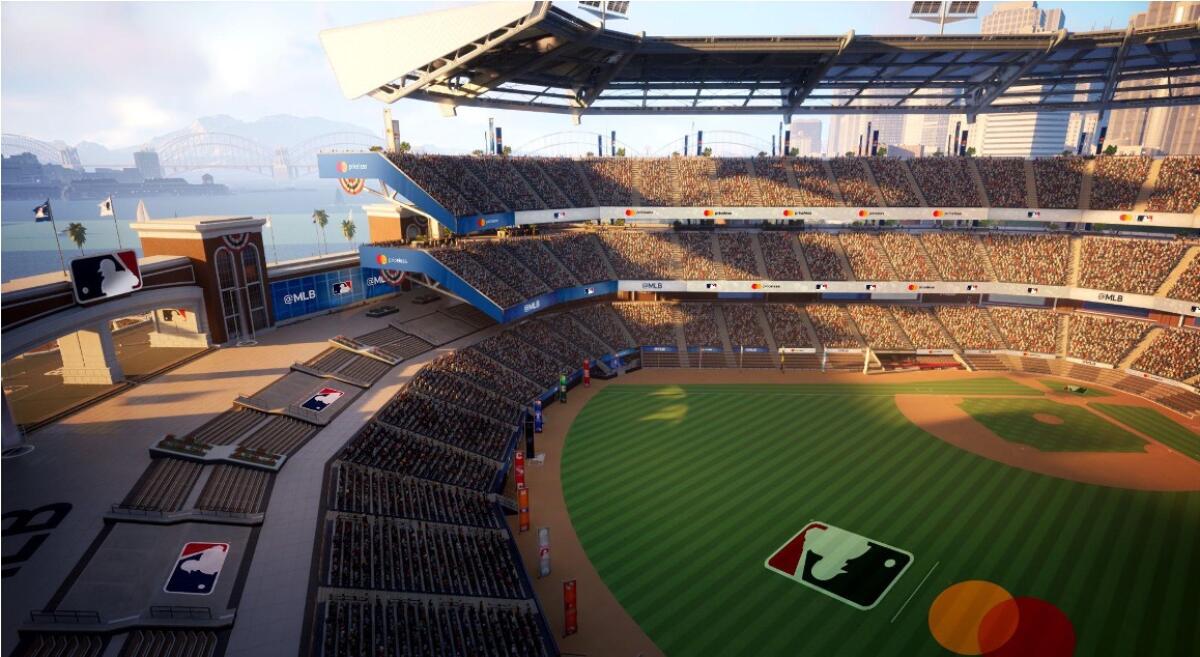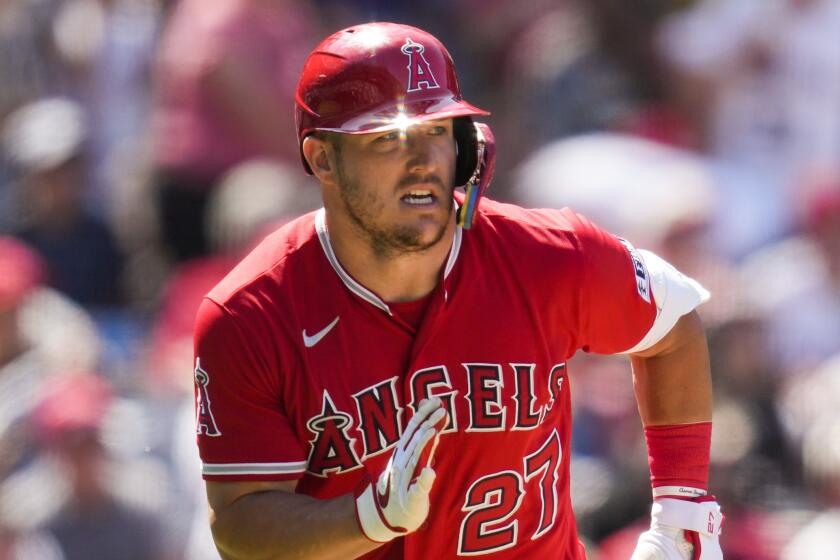Angels-Rays in MLB’s virtual ballpark? How baseball in the metaverse works

- Share via
Watching a baseball game through a stream on your phone or laptop is one thing. Have you ever wondered what that experience would be like in the metaverse?
Enter Major League Baseball’s next digital game-viewing experience, a virtual ballpark to be rolled out for the Angels’ game against the Tampa Bay Rays on Wednesday, the first time the technology will be used in an MLB game.
The virtual ballpark is pretty much what it sounds like — a digital, 3D landscape of a ballpark, synced with MLB’s Gameday 3D. Users log in for free online and will be able to navigate and interact with others who are logged in, similar to walking around an actual ballpark — though in a video-game-looking space — and has no local blackout restrictions. The actual broadcast of the game can be heard and will be shown in that virtual space on the digital screens that mimic a ballpark’s jumbotrons.
For now, the virtual ballpark is just an experiment, said Kenny Gersh, MLB executive vice president for media and business development. It is not meant to alter the underlying media model as it relates to watching an MLB game and will not affect TV ratings.
The Angels star has only played in one game since fracturing his left hamate bone on July 3. He’s hoping to play at some point in the final 12 games.
What the virtual ballpark aims to do is increase exposure to the sport with a more social experience than just watching a game when not at a physical ballpark.
“There’ll always be the option of watching it on TV,” Gersh said. “There’ll be the option of watching it on MLB.TV, the way you would normally for an out-of-market fan. You can watch it on Gameday … where you follow the data. And here’s something that brings it all together.”
It remains to be seen just how much of an impact Wednesday’s experience will have on fans who visit the virtual ballpark. MLB previously rolled out a less-interactive version in an earlier test using the 2023 Celebrity Softball Game during All-Star week.
Using a technology called Morpheus and developed through a metaversal network called M2 — both of which were created and are owned by Improbable, a London-based tech firm that develops virtual spaces — the virtual ballpark for Wednesday’s Angels-Rays game will be limited to 15,000 concurrent users. MLB, though, is not expecting an overwhelming number of fans to participate, Gersh said.

But for Herman Narula, founder and chief executive of Improbable, it’s an opportunity for fans who wouldn’t otherwise have a chance to watch a game in person to have the experience of a live baseball game.
“This is another way for you to have fun, this is another way for you to socialize,” Narula said. “And you know what? For a lot of fans that are not in the U.S., it’s the only way they’re going to have a social experience watching baseball. We really have to think about that, we really have to think about the rest of the world. That’s when the magic really happens.”
Improbable, which was founded in 2012, did not branch into sports until partnering with MLB.
The conversations between Improbable and MLB started last November. Since then, Improbable’s M2 network has also branched into other sports, creating metaverses that act as a kind of meet-and-greet for fans and professional athletes, such as Arsenal Football Club’s Oleksandr Zinchenko. Last month, a virtual stadium was created for a charity soccer game in London that raised money to help rebuild schools in Ukraine.

“You got to make sure that things make sense,” Narula said. “There’s a ballpark, OK. There’s a game that’s happening. But then you kind of start to add in all the elements that are only possible in the metaverse. Like, do you need to walk? You can fly.
“The real people who are going to inform the development of the virtual ballpark are the fans.”
Wednesday’s virtual ballpark, for example, will include interactive games, such as trivia and a digital scavenger hunt. The avatars each user gets, though generic, will have little elements of customization, such as which teams’ jersey to wear. Users can hear the conversations of others logged into the virtual ballpark. They can also get a little bit of a live field-vision of the Angels-Rays game to see what it looks like, for example, behind home plate, first or third base.
And, much like other digital spaces, there will be some safety features, such as being able to mute other users.
But, while the virtual ballpark experimentation continues, MLB can continue to test the boundaries of what it means to stay at the cutting edge of an ever-evolving media landscape. It was in 2002 that MLB first streamed a game on its website, and over the last 12 years, MLB has collaborated with social media sites such as Facebook, Twitter and YouTube, as well as platforms such as Apple TV+ and Peacock, to deliver games.
“Anything that makes a game more accessible will help grow the game,” Gersh said. The virtual ballpark is “something that’s aimed toward a younger, more tech-savvy audience. But for us, it’s just experimenting with ways that we deliver it to the biggest possible audience and each one of these things has its place in the overall mosaic of how we deliver the game.”
More to Read
Go beyond the scoreboard
Get the latest on L.A.'s teams in the daily Sports Report newsletter.
You may occasionally receive promotional content from the Los Angeles Times.








